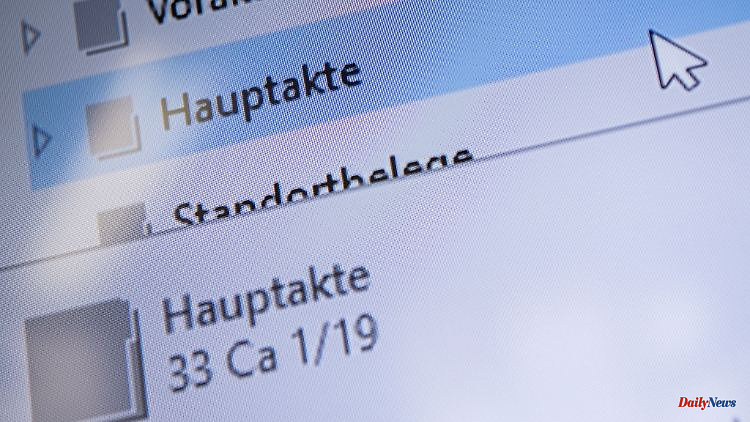Folders and notebooks have had their day: from 2026, all courts in Germany will have to keep their files electronically. How far is Hesse? What are the advantages and where are the problems?
Frankfurt/Wiesbaden (dpa/lhe) - By the middle of the year, the files for civil proceedings in all social and regional courts in Hesse are to be managed electronically. "The introduction of the e-file in the Hessian judiciary has picked up speed," said the Ministry of Justice in Wiesbaden. The judiciary union takes a positive view of the changeover, but warns against overburdening employees during the transition period.
Hesse is "in the lower midfield" among the federal states when it comes to the changeover, as the state chairman of the German Justice Union Hesse, Erwin Schmidt, told the German Press Agency. A federal law stipulates that the entire judiciary in Germany must work with electronic files from 2026. According to the ministry, the schedule for Hesse provides for "full implementation of the legal obligations by December 31, 2025".
Saying goodbye to paper brings many advantages, according to the ministry: "Work processes can be designed more effectively. There is no need for labor-intensive and costly printing. The file is available to several people at the same time." The union also sees better opportunities for remote working as another benefit.
According to the ministry, the district courts of Limburg, Kassel, Hanau, Fulda and Gießen are already working with the electronic file. The district courts of Darmstadt, Wiesbaden, Marburg and Frankfurt are to follow in the coming months. A pilot test for criminal proceedings is currently underway at the Darmstadt public prosecutor's office.
The experiences of the colleagues were mostly positive, said trade unionist Schmidt. "However, the transition period leads to a considerable burden that pushes the colleagues to their limits." On the one hand, technical problems were inevitable, on the other hand, the paper files would have to be maintained in parallel during the transition phase. "You have to make sure that there is no overload situation."
According to Schmidt, this transition phase in a court can last about three months. During the introduction, "thoroughness before speed" must also apply. The first local court to introduce the electronic file was Bad Homburg. According to the ministry, the 40 district courts in Hesse are to be gradually converted.
Some of the other federal states are further along - according to the German Justice Union, for example Bavaria, Baden-Württemberg and North Rhine-Westphalia. They work with a different system, which the union sees as suboptimal. "Of course it's a shame that it's such a patchwork quilt," says Schmidt. The e-file facilitates the exchange between courts within Hesse - if the procedure is handed over to another federal state, it can even become more complicated because the systems are not compatible.












